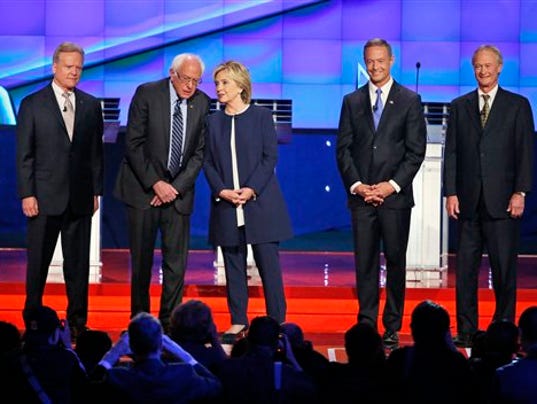Results 1 to 1 of 1
Thread Information
Users Browsing this Thread
There are currently 1 users browsing this thread. (0 members and 1 guests)
-
02-02-2016, 04:45 PM #1
Iowa caucuses to have impact in TX primaries, SUPER TUESDAY
Iowa caucuses to have impact in TX primaries
Marty Schladen, El Paso Times
10:22 p.m. MST February 1, 2016

(Photo: John Locher, AP)
AUSTIN - The results of the Iowa caucuses on Monday likely mean that leading Republicans will take an intense interest in the March 1 Texas primary, while Democrats probably won’t pay as much attention to the Lone Star State, a political expert said.
With 98 percent of the vote counted, Texas Sen. Ted Cruz pulled off a big victory, beating businessman Donald Trump by about four percentage points. But Florida Sen. Marco Rubio effectively made it a three-way race by garnering about 23 percent of the vote, just one percentage point behind Trump.
“There were two real victories tonight - Ted Cruz who won outright and Marco Rubio who outperformed expectations,” said Rice University political scientist Mark Jones, adding that Rubio now might go to New Hampshire Feb. 9 “and deliver a knockout blow to (former Florida Gov.) Jeb. Bush, (Ohio Gov.) John Kasich and (New Jersey Gov.) Chris Christie.”
Meanwhile, on the Democratic side, a virtual tie translates into a victory for former Secretary of State Hillary Clinton, Jones said.
Her opponent, Vermont Sen. Bernie Sanders, had advantages in Iowa that he’ll carry into New Hampshire, but in few other states than Vermont, Jones said.
Sanders lost a crucial opportunity to build momentum in Iowa, he said.
Brandon Rottinghaus, a political scientist at the University of Houston, said the number of votes at stake in Iowa are “a drop in the bucket.” But, it’s the first contest of a frenzied February that will lead up to Super Tuesday on March 1, the day that 14 states hold primaries or caucuses.
For the first time, Texas will be part of Super Tuesday, and it will be the biggest prize that day.
“All eyes will be on Texas March 1,” Jones said.
The outcome of the races in Iowa could feed or detract from candidates’ narratives about their viability as they head into New Hampshire and then to South Carolina and Nevada, starting Feb. 20.
For Trump, there was good and bad news in Monday’s results.
“There’s been serious doubts about whether Trump’s poll numbers will translate into votes at the polls,” Jones said.
“They roughly did tonight.”
But the results also disrupt Trump’s central narrative about himself.
“The glass-is-half-empty side is that Trump lost and Donald Trump does not want to be a loser,” Jones said.
With early voting in Texas starting Feb. 16, candidates will have to turn at least some focus to the Lone Star State even before they know how they did in the late-February contests.
In Texas, the top three finishers in Monday’s Republican caucus will have different goals.
“Cruz has to win and win big,” Jones said. “Rubio has to show himself to be the clear alternative to Trump and Cruz. Trump can lose, but he can’t be blown out.”
Cruz invested serious resources in the Hawkeye State in hopes of creating momentum to carry him to Super Tuesday, where he also has invested heavily in the “SEC Primary” - the Deep South states that have contests that day. Winning big in his home state is a key part of that strategy.
If Trump performs well enough in Texas and well in the other Super Tuesday contests, it will support the results he’s been getting in the national polls, which Jones said are not very reliable this early in the race.
Rubio will come to Texas trying to package himself as an attractive alternative to Trump and Cruz, Jones said.
Meanwhile, Bush is fighting for his political life. Jones said a poor performance in Iowa could finish his campaign.
If Bush makes it to Texas, supporters would expect him to do well in a state from which his father and brother – both former presidents – hail and his son holds statewide office.
“Texas could very well be the final nail in Bush’s coffin,” Jones said.
Before the caucus, Rottinghaus said a strong Sanders performance in the Democratic Primary could put the Clinton campaign in “full panic mode” and prompt workers to scramble to Texas.
After the caucus, Jones said that now seems unlikely. What visits the Democrats do make to Texas will likely concentrate on Democratic hotbeds, such as El Paso, Austin and the other big cities.
The Republicans, however, probably won’t spend much time in the Sun City. With only about three delegates at stake in El Paso County, the Republican candidates will probably focus their efforts elsewhere, Jones said.
Marty Schladen can be reached at 512-479-6696; mschladen@gannett.com; @martyschladen on Twitter.
http://www.elpasotimes.com/story/new...ries/79665982/
NO AMNESTY
Don't reward the criminal actions of millions of illegal aliens by giving them citizenship.
Sign in and post comments here.
Please support our fight against illegal immigration by joining ALIPAC's email alerts here https://eepurl.com/cktGTn
Similar Threads
-
Schedule of GOP primaries and caucuses
By JohnDoe2 in forum General DiscussionReplies: 0Last Post: 10-06-2015, 11:46 AM -
"California Looms Huge In Super Tuesday Primaries"
By AirborneSapper7 in forum Videos about Illegal Immigration, refugee programs, globalism, & socialismReplies: 0Last Post: 02-05-2008, 12:07 AM -
How to untangle the politics of Super Tuesday primaries
By zeezil in forum illegal immigration News Stories & ReportsReplies: 0Last Post: 02-04-2008, 09:51 PM -
Campaign watch: The Iowa caucuses
By zeezil in forum General DiscussionReplies: 0Last Post: 01-04-2008, 05:08 PM -
History of Iowa Caucuses
By CitizenJustice in forum illegal immigration News Stories & ReportsReplies: 0Last Post: 01-04-2008, 12:38 AM


 LinkBack URL
LinkBack URL About LinkBacks
About LinkBacks




 Reply With Quote
Reply With Quote


We must push through early Thurs at this critical moment
04-24-2024, 10:44 PM in illegal immigration Announcements